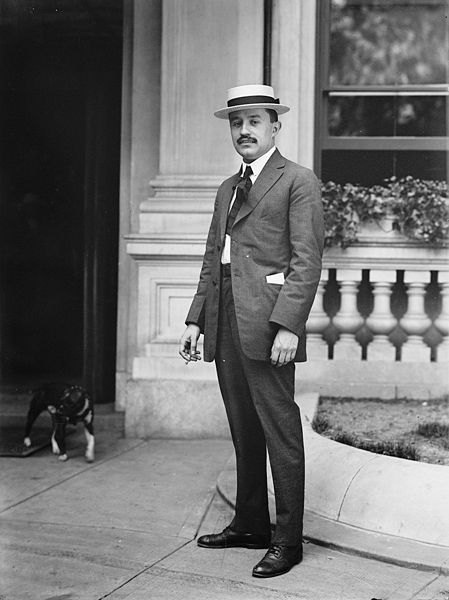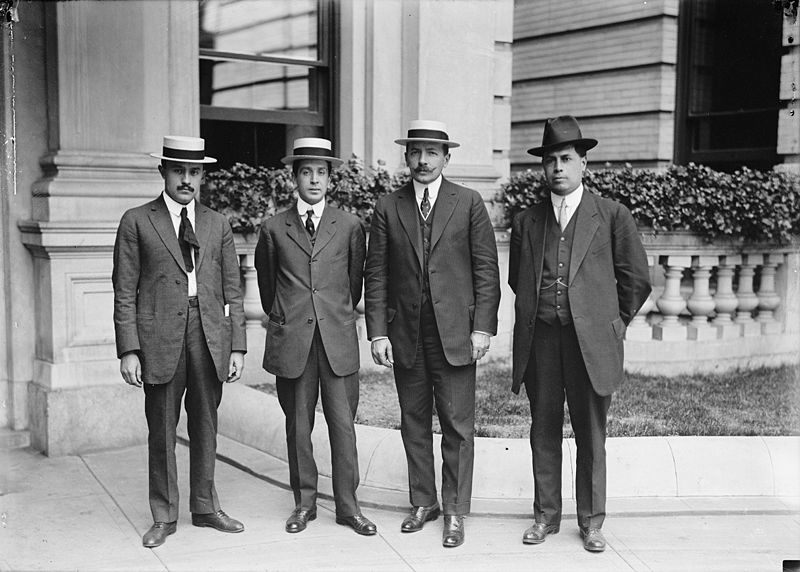<Back to Index>
- Philosopher Ernest Renan, 1823
- Architect Frank Owen Gehry (Ephraim Owen Goldberg), 1929
- Secretary of Public Education Jose Vasconcelos Calderón, 1882
PAGE SPONSOR

José Vasconcelos Calderón (28 February 1882 – 30 June 1959) was a Mexican writer, philosopher and politician. He is one of the most influential personalities in the development of modern Mexico. His philosophy of "indigenismo" affected all aspects of Mexican sociocultural, political, and economic policies. Vasconcelos is often referred to as the father of indigenismo.
Vasconcelos was born in Oaxaca, Oaxaca. He lived in Piedras Negras, Coahuila, while attending school in Eagle Pass, Texas. He married Serafina Miranda of Tlaxiaco in the state of Oaxaca in 1906. After graduating as a lawyer from the Escuela de Jurisprudencia in Mexico City (1905), he represented the Anti-Reelection Club in Washington, D.C., USA, and supported the Mexican Revolution of 1910 headed by Francisco I. Madero. When Madero was democratically elected president of Mexico, Vasconcelos led a structural change at the National Preparatory School, where he changed the scholar programs, breaking with the positivistic influence. After Madero's assassination, promoted by the US ambassador Henry Lane Wilson, Vasconcelos organized a democratic movement in order to defeat the military regime of Victoriano Huerta. Soon after, he was exiled in Paris, where he met Julio Torri, Doctor Atl, Gabriele D'Annunzio and other intellectuals and artists of that time.
After the Convention of Aguascalientes in 1914, Vasconcelos was elected as Minister of Education during the brief presidential period of Eulalio Gutiérrez. Later, after a brief period of exile in the United States following a disagreement with Venustiano Carranza (1915 – 20), he returned and directed the National Autonomous University of Mexico (1920) and created the Secretariat of Public Education (SEP), in 1921. He served as the first Secretary of Public Education under Álvaro Obregón. He resigned in 1924 because of his opposition to President Plutarco Elías Calles.
In that position he had worked in favour of the education of the masses
and oriented the nation's education efforts along secular, civic, and
Pan-American (americanista) lines. He ran for president in 1929 but lost to Pascual Ortiz Rubio in a controversial election and again left the country. He later directed the National Library of Mexico (1940) and presided over the Mexican Institute of Hispanic Culture (1948). Vasconcelos' first writings on philosophy are passionate reactions against the formal, positivistic education at the National Preparatory School, formerly under the influence of porfirian thinkers like Justo Sierra and Gabino Barreda. A
second period of productivity was fed by a first disappointment in the
political field, after Madero's murder. Then he wrote, in 1919, a long
essay on Pythagorism, as a dissertation on the links between harmony and rhythm, and its eventual explanation into a frame of aesthetic monism. As he argued that only by the means of rhythm is the human being able
to know the world without any intermediation, he proposed that the
minimal aspects of cognition are conditioned by a degree of sympathy
with the natural "vibration" of things. In this manner, he thought that
the auditive categories of knowledge were much higher than the visual
ones. During
a later period, Vasconcelos developed an argument for the mixing of
races, as a natural and desirable direction for humankind. This work,
known as La raza cósmica (The Cosmic Race), would eventually contribute to further studies on ethnic values as an ethic,
and for the consideration of ethnic variety as an aesthetic source.
Finally, between 1931 and 1940 he tried to consolidate his proposals by
publishing his main topics organized in three capital works: Metaphisics, Ethics and Aesthetics. Vasconcelos is often referred to as the father of the "indigenismo"
philosophy. In recent times, this philosophy has come under criticism
from Native Americans because of its negative implications concerning
indigenous peoples. To an extent, his philosophy argued for a new,
"modern" mestizo people, but at the cost of cultural assimilation of
all ethnic groups. His research on the nature of Mexican modern
identity had a direct influence on the young writers, poets,
anthropologists and philosophers who wrote on this subject. He also
influenced the point of view of Carlos Pellicer with respect to several aesthetic assumptions reflected in his books. Together, Pellicer and Vasconcelos made a trip through the Middle East (1928 - 29), looking for the "spiritual basis" of Byzantine architecture. Other works, particularly La raza cósmica and Metafísica, had a decisive influence in Octavio Paz's El laberinto de la soledad, with anthropological and aesthetic implications. Paz wrote that Vasconcelos was "the teacher" who had educated hundreds of young Latin American intellectuals during his many trips to Central and South America. Vasconcelos was guest lecturer at Columbia University and Princeton University, but his influence on new generations in the U.S. became gradually less significant. Nevertheless, his work La raza cósmica has been used by Chicano and Mexican-American movements since the 1970s, asserting the establishment of a new culture in the American Southwest based on their Mexican ancestry.
Thanks
to José Vasconcelos, the National Symphonic Orchestra (1920) and
the Symphonic Orchestra of Mexico (1928) were officially endorsed. Muralists Diego Rivera and David Alfaro Siqueiros were given the right to paint the inner walls of the most important public buildings in Mexico (e.g., the National Palace in the capital), creating the Mexican mural movement. "...
the leaders of Latin American independence ... strove to free the
slaves, declared the equality of all men by natural law; the social and
civic equality of whites, blacks and indians. In an instant of
historical crisis, they formulated the transcendental mission assigned
to that region of the Globe: the mission of fusing the peoples
ethnically and spiritually." (La raza cósmica, 1948) "Each
of the great nations of History has believed itself to be the final and
chosen one. [...] The Hebrews founded the belief in their superiority
on oracles and divine promises. The English found theirs on
observations relative to domestic animals. From the observation of
cross-breeding and hereditary varieties in such animals, Darwinism
emerged. First, as a modest zoological theory, then as social biology
that confers definitive preponderance to the English above all races.
Every imperialism needs a justifying philosophy". (La raza cósmica, 1948) "Hitler,
although he disposes of absolute power, finds himself a thousand
leagues from Caesarism. Power does not come to Hitler from the military
base, but from the book that inspires the troops from the top. Hitler's
power is not owed to the troops, nor the battalions, but to his own
discussions... Hitler represents, ultimately, an idea, the German idea,
so often humiliated previously by French militarism and English
perfidy. Truthfully, we find civilian governed 'democracies' fighting
against Hitler. But they are democracies in name only". ("La
Inteligencia se impone", Timon 16, June 8, 1940)
